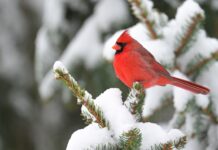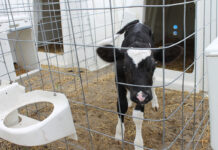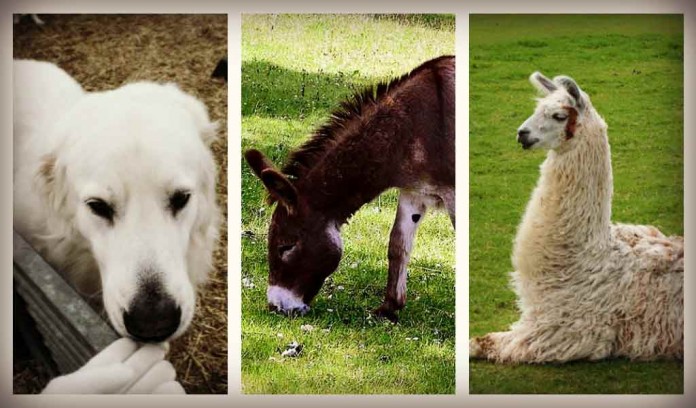Predators can be a big problem for farmers. 647,200 head livestock were lost to predators on American farms and ranches in 2010. That’s an estimated $137.7 million loss (USDA National Agricultural Statistics Service).
Coyote, wild dogs, fox, coons and birds of prey top the list of predators that plague farmers in our region. Livestock guardians keep vulnerable stock safe. Dogs, donkeys and llamas are proven protectors.
Dogs
Great Pyrenees, Anatolian Shepherds, Akbash and Maremma are breeds reputed to be superior livestock guardians, but many farmers and ranchers argue a well-trained mutt is just as effective.
A good livestock protection dog is intelligent, hardy to all weather conditions, loves work and has a manageable prey drive so that it does not turn on the livestock it is supposed to be protecting.
Dogs protect livestock by aggressively pursuing predators, chasing-off or taking-out. A single dog may be enough to protect a small herd, but multiple dogs work together to watch over a large herd.
Training. Dogs should be raised with livestock so that they will bond with the stock, not human handlers. Pups are placed with animals at 8-12 weeks of age. They are trained to stay near stock and keep a watchful eye. A dog reaches full protection potential at 18-36 months of age.
Care. Dogs are the most expensive livestock protection animals to purchase and keep. The price of a registered livestock protection breed can cost hundreds to thousands dollars depending on breed and bloodlines. A certified trainer charges $600 – $3000. Food and regular vet care are on-going costs of dog ownership.
Big benefit. Unlike donkeys and llamas, dogs can provide protection on the open range- no fence required.
Donkeys
Despite their nickname and reputation of stubbornness, donkeys are smart and effective livestock guardians. They have great eyesight and hearing to detect predators.
Donkeys are naturally territorial animals that alert farmers of intruders with their noisy “HeeHaw!” They challenge intruders by charging, kicking and biting. Last year a fellow goat farmer boasted his guard donkey for fighting off a pack of wild dogs and saving his herd. A single donkey can protect up to 300 head. A castrated male or female donkey is recommended.
Training. Donkeys require no special training, but takes 4-6 weeks of interaction to bond a donkey with a flock or herd. Caution must be taken during birthing season when a donkey might accidently step on and crush baby sheep or goats.
Care. Donkeys are low-maintenance animals. They require regular hoof trimming, worming, and vaccinations. They can eat the same feed as goats or sheep as long as it is not medicated for small ruminants.
Big benefit. It is possible to acquire a low-cost or free donkey from an equine rescue facility.
Llamas
Llamas are instinctively herding animals. They bond easily with small ruminants, and fit well in any herd or flock.
When a llama spots an intruder it charges, kicks and spits. It will strike and stomp the predator to death. Camelids reach full protection potential at about 18 months of age. Castrated males or females are recommended.
Training. Llamas do not need to be raised with a herd or flock. They should be introduced in a small and safe setting until bonded.
Care. Llamas can be fed the same as sheep or goats. They eat very little. They prefer grass to grain. Camelids are ruminants with similar health, hoof, and shearing needs to sheep.
Big Benefit. Llamas have a very long lifespan that allows them to put in an average 20-30 years protection service.
Sources: Cattle Death Loss, USDA NASS, Sheep and Goat Death Loss, USDA NASS












I beg you to please remove donkeys from this list. Every week, my Facebook rescue page receives messages pleading me to take their jacks because they are killing what they’ve been forced to protect. They either attack the adults or the kids, calves, lambs, etc. It doesn’t stop there. They’ll also kill chickens, cats, dogs, rabbits……anything they deem as trespassers in their pasture. After a donkey killed a coyote in the 1980’s, somehow this notion that they are protectors spread like wild fire. It seems normal for farmers to turn these donkeys out with their livestock and forgot about them. They become obese, wild from not being handled, lame with terribly overgrown hooves, founder and laminitis……this list goes on. The farmers that choose to try and help the donkey, by having it rescued, are usually met with, “I’m sorry, but we are full.” The ones that choose the “easy” route either shoot them or open a gate and let them go. I even had one person tell me, who lives very close to the interstate, he hoped the donkey got hit on the road because it attacked his cattle. None of this sounds like a good animal to choose for a guardian, does it. I could go on and on about all I’ve heard. It depresses me and makes me angry. These are the most intelligent and loving animals I’ve ever had the pleasure to care for. They do not deserve to be mislabeled.
I wholeheartedly second what Lauren has written here. If the example is true, one donkey protecting 300 herd of donkeys from a pack of wild dogs…THAT must be one in a thousand, hundred thousand, million. This is very misleading to people who do not know better. It sets up the person for failure and the donkey for a very questionable life. Donkeys do deserve better. Much has been built off their backs and they earned and deserve better consideration and care.
Please take the donkeys off your list of guard animals. They are to small to do the job. If you have an intact male they may kill the animals they are suppose to protect. Donkeys are gentle loving animals and need their own kind to have a good life. They are not a cheap pet for they need the same care as any other Animal
If you are taking care of them properly. To many of these animals suffer greatly without that care. They have earned the respect to be treated fairly and are not throw away animals like have happened to so many because they have been gotten for the wrong purpose. Thank you for listening please consider the tamifivation that categorizes them as guard animals.
As a farmer who is experienced with livestock and guard animals, I have seen an entirely different experience with donkeys as guard animals than the other commentors described-they are VERY effective and protective to livestock when no other equines are with them The best ones to get are from feral stock and females. (there are no true ‘wild’ donkeys in this country-ALL are descended from escaped/released animals) Donkeys are quick when they want to be-I have known of donkeys killing coyotes and roaming dogs within a few feet of the fence in very large pastures. Please dont let these comments deter you from getting a guard donkey-while I prefer dogs because they are able to get across ant fence a predator can breech to run the predator down and kill it, donkeys can be valuable as guard animals and a whole bunch cheaper to get and care for.
My cows run my donkeys away from feed! I have never ever seen my donks bother my calves or cows. My male donkey stands alone but is always watching. I had a mountain lion attack one of my little female donkeys and it ripped its hind quarters down to its hock. It didnt get away with the foal. Its momma and mom’s sister had tear marks around there necks. The mountain lion didn’t get its prey this time!
“A whole bunch cheaper…..” Well, I’m sure doing something wrong because my donkeys cost a lot more to take care of than my dogs do. Perhaps your donkeys aren’t being properly cared for. Mine are trimmed every 5 weeks because being kept on pasture does not allow for self-trimming. Every donkey that I’ve seen, that were former guardians, never had their hooves trimmed, were regularly dewormed (if ever), handled or vaccinated. Most donkeys are not canine aggressive, but some are. Just because you’ve had one or two that did kill a canine, doesn’t mean the next one will. It’s not an animal’s responsibility to do what a human should be doing. If stray dogs and coyotes are coming into your pastures, then your fencing is inadequate.
I wont stoop to your level and argue with you….Readers-this person and the other commentors are animal rights/anti horse slaughter proponents who are all connected proclaiming their ‘rescues’ keep donkeys from being slaughtered and treated how THEY deem ‘proper’. They are all connected in their ‘activism’. The entire equine population is suffering greatly because they are losing having a purpose-whether it be a draft animal, a pleasure animal, a meat animal, a pet, or a guard animal. By eliminating ANY of these uses, you are greatly harming the equines (donkeys in this specific case). Please do not take these commenters comments as truths-they are merely personal emotions of these people and are NOT what the majority of farmers who have guard donkeys have experienced.
Respect for this response. Can’t argue with a wall.
To Fed-up: “Please do not take these commenters comments as truths-they are merely personal emotions of these people and are NOT what the majority of farmers who have guard donkeys have experienced.”
Personal emotion has little to do it. Facts do. Please come to Texas and I will personally show you the result of attempting to use donks for guardians. Among the 5,000 currently under the care of the Peaceful Valley Donkey Valley Rescue in San Angelo, Texas, 3000 came from County Sheriffs as abandonment cases during the recent drought. These animals were over-bred and when they threatened the cattle ranges that already been destocked, irresponsible ranchers by the dozens loaded up these “unwanted” animals and hauled them to another county in the dead of night and released them on back roads. This is not “emotion”, this is fact.
As to the effectiveness of donkeys as livestock guardians, I have, as a donkey welfare advocate professional, studied this issue for years. I would LOVE for the “unwanted” donkeys to have a “job”, if it were effective. Again, time and experience proves that it is hit and miss, entirely dependent on the individual donk. For every success story, I can point to two dozens failures. Articles like these put forth the notion that donkeys are “natural” protectors, and encourage people to try it. When the animal fails at the job, what happens to the animal? Abandonment, dumping on rescues, sale to slaughter.
Don’t you think that donkey rescue people would actively encourage this if it was effective and good for the donkey? Why would an organization like PVDR want to keep thousands of donkeys on sanctuary, footing all the bills, if such a release valve was available?
I encourage you to put your prejudices aside about “animal rights people” and do real research.
Donks are as TOUGH as they come in the animal world. After many years of hunts to rope and catch them, Donks have proven to be more than a match for the hunter/roper. They can stand their own as it relates to all dogs–except maybe a game pit bull. All other animals who try and destroy my sheep, cows find a formidable advisory!
to all of you saying that donkeys are not good for this list. if you go back and read your own reasoning for why they are bad, that all boils down to lack of responsibility of their owners for not deworming them, not trimming their hooves, not taking the time to properly integrate their donkeys into the flocks they protect. that is a human interaction problem, not a donkey problem. you sit there trying to throw stats of how many are in shelters, etc. which can be said about any livestock or domesticated animal, theres always going to be some type of rescue shelter trying to save whatever animal it is and you will try to use those stats vs the many more that are not in those shelters and are working out for others. you are trying to blame donkeys for not being good guard animals when every reason you give of why is not the donkeys fault, it’s their owners who aren’t running their farms properly. use some common sense.
Hello
I have a great Pyr puppy that I am raising to be a guardian for my seven sheep but I need a guardian right now. I was thinking of buying an adult female llama. My only concern is if the new llama would attack the puppy. Would you all provide me some guidance please?
It is so good